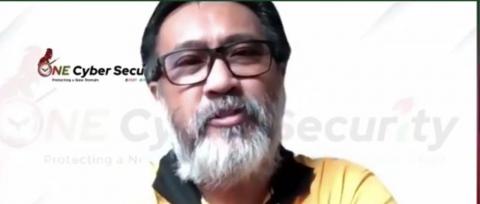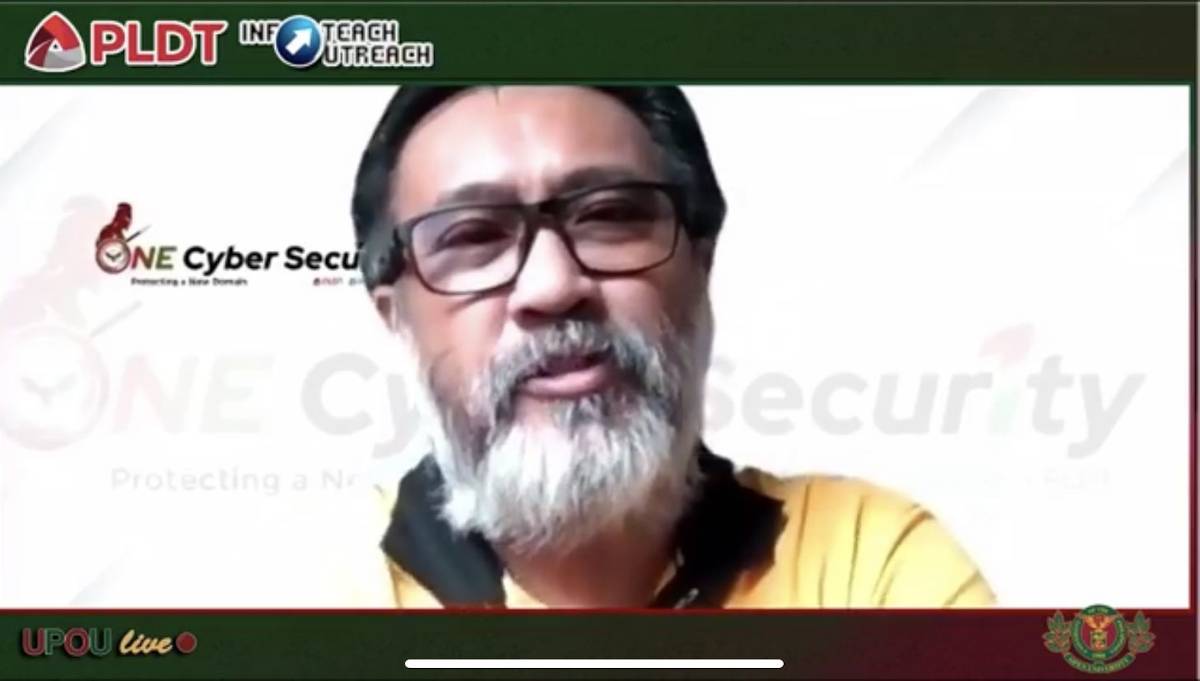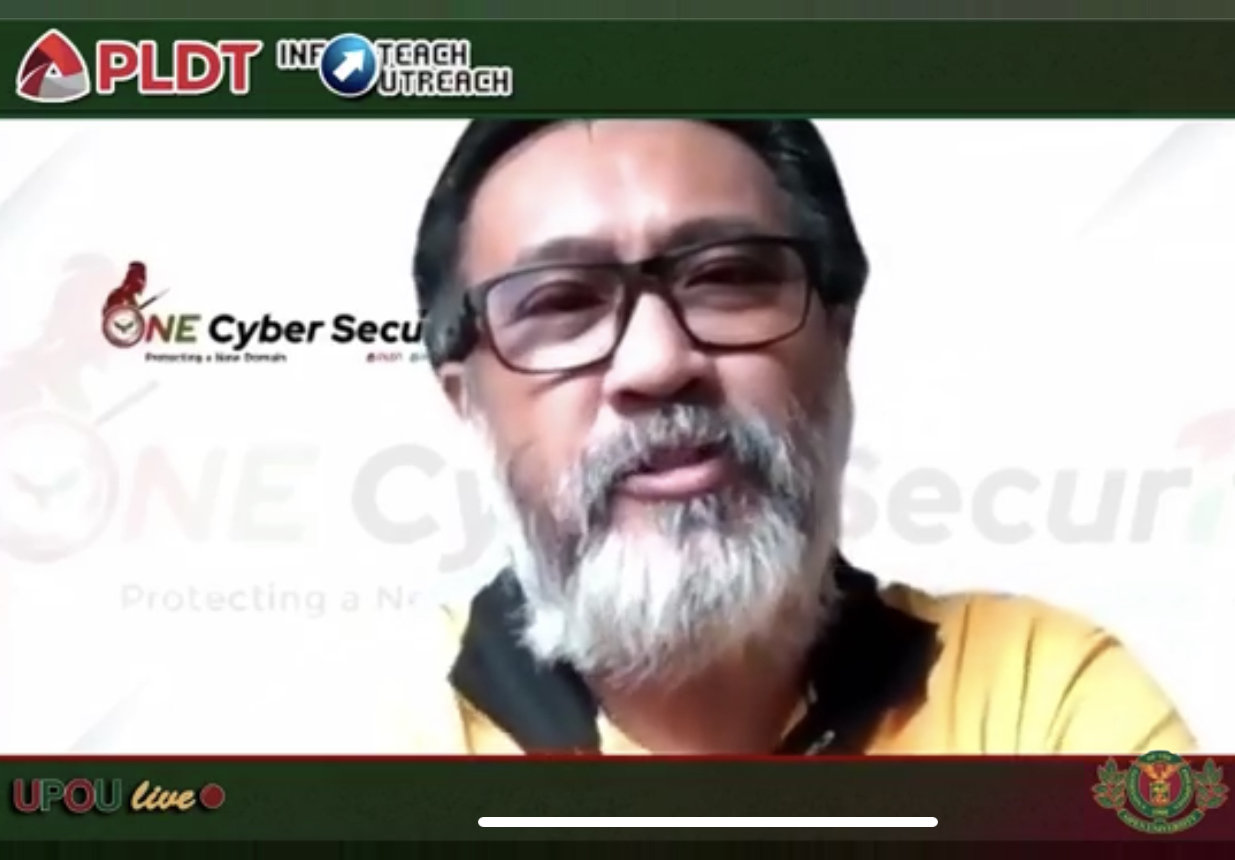

PLDT Chief Information Security Officer Angel Redoble
With many schools going online as classes reopen this year, cybercrime has become a major concern for educators. Cyber security experts warn that the incidence of various types of online mischief has soared since the onset of the COVID-19 pandemic and could cause trouble as teachers and students assemble in virtual classrooms.
To help address this concern, PLDT and the University of the Philippines Open University (UPOU) recently held a special webinar session on cybersecurity. The panelists included Legal Officer Atty. Marinel Oro from the Department of Education (DepEd) Division of Mandaue City, PLDT Chief Information Security Officer Angel Redoble and PLDT Public Affairs Head Ramon Isberto.
“As our education sector shifts to digital learning, there is an urgent need to protect our teachers and students from the possible threats in the cyber world,” said UPOU Chancellor Mel Bandalaria said.
Cybercrime booming
According to Redoble, in July 2020, the number of active Internet users around the globe has risen to over 4.57 billion. Alongside with this, the danger of cybercrime has also grown. These include child pornography, cyberbullying, online gaming/gambling and online theft or hackers.
Redoble shared that the PLDT Group’s cyber security operation center has become much busier blocking malicious sites trying to reach and victimize PLDT and Smart customers online since pandemic restrictions forced people to work and study from home.
“We noticed that about 80,000 of these malicious websites were COVID-19-related bogus websites. In May, there were another 100,000 websites of COVID-19-related bogus websites. These are sites pretending to provide information about the pandemic or raising funds ostensibly to help frontliners fight the virus,” Redoble said.
To guide people in dealing with such threats, Redoble shared the acronym “FALSE” to provide an easy way to remember the specific things to watch out for in phishing scams done via e-mails which is one of the common means of cyber mischief. “F” stands for File attachments, “A” for Attention-grabbing offers, “L” for Links, “S” for unknown Sender and “E” for the Element of time (urgent offers).
When it comes to governance, Rodeble stressed it is important to have the full support of the top management team of an organization to strengthen cyber security.
“We must create a cyber security culture where everyone talks about it on their own level. There must be a clearly documented and implemented policies and procedures as well as incidence response plan. We must always be on the lookout for all these cyber attacks. Through this, we remain vigilant and well-prepared,” Redoble said.
DepEd’s Atty. Oro made a similar observation, pointing out that the Schools Division of Mandaue City had put in place policies to support capability-building in cybersecurity within its organization and to invest in a system that filters the internet traffic in their network.
For the past years, the DepEd has heavily relied on traditional teaching through face-to-face interaction. Oro mentioned how the Schools Division of Mandaue City has started to implement virtual platforms to teach their students.
“With the remote and distance method of learning, the Internet became an important resource to communication not just with our teaching personnel but especially with our students,” Oro said.
“Cyber space will truly be a big part of how our schools will operate this school year. This new normal in teaching is an avant-garde method. As we move through the digital space, we ensure that cybersecurity becomes a part of our system because online teaching and learning are here to stay,” Oro added.
Humanizing cyber security
For Isberto, cybersecurity is very much a human and personal issue.
“This is all about human behavior. Cyber security is about how people behave and how they conduct themselves in the cyberworld. It is also very personal, because the target of cybercriminals is You,” he explained.
According to some studies, cybercrime is now bigger than drugs. In 2020, according to some studies, the cybercrime industry will make $7 trillion worldwide.
“The image that many people have of cybercriminals is that of the computer hacker wearing a hooded jacket. The more appropriate image is that of the Godfather whose criminal syndicate is busy trying to victimize you,” Isberto said.
According to him, teachers must help their students protect themselves by developing a sense of awareness of the many threats that exist in the cyberworld.
“Parents teach their children how to be street smart in the real world. We need to teach students how to survive and thrive in the rough streets of the virtual world,” he explained.
This requires building a healthy sense of distrust. Cybercrooks take advantage of people’s tendency to be trusting.
“That’s why it is essential that our default position is that one should not be too trusting. One must raise their distrust level. Do not give your trust easily – that’s the fundamental point,” Isberto said.


